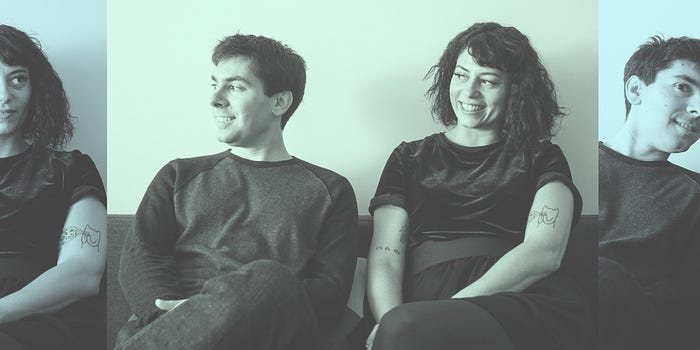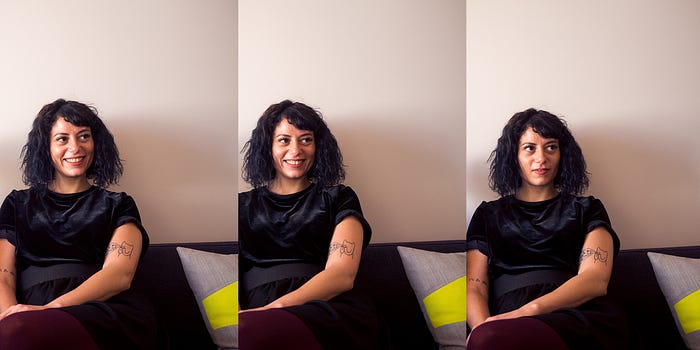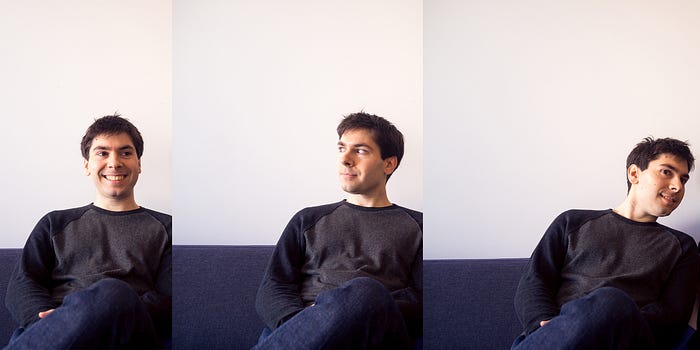Meet the Medium “Elevators”
Stephanie Georgopulos and Harris Sockel spend their days searching for great writing on Medium

Stephanie Georgopulos and Harris Sockel are editors at Medium who started out using the platform back in 2013, writing and publishing stories that explored the human condition. Now, they work to “elevate” independent, self-published writers on Medium. Georgopulos and Sockel scour Medium to find great stories they think deserve a wider audience than they may otherwise be getting.
They reach out to the writer and work with them on improving their piece, then distribute it broadly through Medium’s topics, publications, homepage, emails, and social channels.
Medium VP, Editorial Siobhan O’Connor explained the various ways that the editorial team works with writers — from the commissioned stories in our monthly magazine to exclusive columnists, plus reported features and insightful essays. She also described how we work with writers self-publishing on Medium — and this interview explains that in greater detail.
Hi there. Can you tell us what you do?
Harris Sockel: We’re finding great writers on Medium and working with them to develop their stories to reach a wider audience. Basically, we work to find compelling voices and build relationships.
How did you begin working at Medium?
Stephanie Georgopulos: I’ve been writing on Medium since the site was in beta. I built a publication called Human Parts on Medium back in 2013, and Harris was one of my first contributors.
About a year in, I needed help managing the number of submissions I was receiving, and I felt that Harris’s writing embodied the spirit of what I wanted Human Parts to be. We met up for a drink and by the time we left, I had my partner. I joined Medium full time in 2016 as a curator, and you can guess the rest from there.
The majority of the writers Harris and I ended up working with on Human Parts started out self-publishing on Medium as well. What we do now — looking for great writing, and not really knowing what we’re going to find when we arrive at work in the morning — originates with that editorial experience.
What draws you to this kind of work — collaborating with writers from the platform?
Georgopulos: There’s a raw enthusiasm from a lot of these writers, who just had to publish these stories, even without confirmation that payment and readers would be waiting.
I’ve been a freelance writer before; I’ve written things just to make fifty dollars. So, I understand there can be a different energy that goes into something you’re writing for an assignment versus something you’re writing for yourself.
Sockel: I’ve learned a lot getting to work with experts who write about their industries. Medium is home to doctors, scientists, designers — leaders in their fields. And they don’t necessarily want to be career writers, but they have expertise that’s really valuable.
Can you talk a bit about what writers get out of self-publishing on Medium?
Sockel: I think writing on Medium means the opportunity to reach a wide audience without the overhead of creating your own blog. You don’t need a reputation, followers, or any type of pre-ordained cred to write here and find people willing to listen.
Georgopoulos: If the Medium Partner Program had existed when I was a freelancer, I would’ve had more options. I’ve had lovely relationships with editors, but at the end of the day, they have to commission stories that make sense for their publication and audience. So when writing is your primary income, you have to make choices about which ideas to pursue. And I think the Partner Program means writers don’t have to choose — you can pitch a big, ambitious idea to an editor, and you can also write something for which there is no natural, obvious publisher. You can monetize your killed stories, your tweetstorms . . . Medium’s always been good for writing first and placing later, but now you can get paid, too. I think a lot of us have trained ourselves to write what we can sell to publishers, but when you’re “selling” directly to readers, you can create and respond to your own audience rather than borrowing one. This is essentially what we do on social media already, for free.
It goes back to the idea that all of our output on digital publishing platforms and even social media websites is a form of work.
Georgopulos: Right. On many sites and platforms, the work you’re doing — there are ads being sold against it. Medium has always been . . . people call it longform Twitter, but I don’t think it’s like Twitter at all. It’s a place to parse things, not just throw them out there and forget about them later.
I like processing my thoughts through writing without feeling like I need to have something massive to say every single time. Or that I need a news angle just to speak. And I think that’s been a huge problem with the internet, particularly with personal essays. To sell, it always has to be confessional or
Sockel: This huge revelation —
Georgopulos: Your most private thoughts.
Sometimes it’s okay to find meaning in lightness.
What’s an example of a story like that? That felt urgent even if it wasn’t timely?
Sockel: “Enjoli” by Kristi Coulter. It’s a very personal (and very funny) essay about getting sober in a culture where everyone seems to be drinking all the time. I remember when I first read it (Steph sent it to me) and it was that feeling of, this is the story that she had to tell, and she’s telling it in her own way — she’s writing it for herself.
Georgopulos: And it led to Kristi getting a book deal — her first book of essays, Nothing Good Can Come from This, was published last summer by Macmillan. It’s pretty heady to go to work everyday not knowing what opportunities it might create for someone else.

What’s a story that more recently came through that you really enjoyed?
Georgopulos: There are so many, but “Living in Deep Time” by Elizabeth Childs Kelly was one I really loved on a personal level. As many women noted during and since, the Kavanaugh confirmation illustrated to women how our culture regards and values our experiences, and frankly, that picture was monstrous. Throughout the trial I read many personal accounts that echoed Christine Blasey Ford’s, a lot of articles making logical arguments about why this confirmation couldn’t move forward. And in the aftermath, when it did, it kind of felt like . . . do our words matter that little? Why even bother? “Living in Deep Time” reminded me why we bother. It reminded me that you can seize power without stealing it.
Writers are motivated by different things. How do you tailor your approach for each person?
Sockel: Every writer is different. Some want to earn money from their work and build careers in writing. Others want to share expertise they’ve gained from working in another industry, so targeted distribution to a niche audience might be more what they’re looking for. The same goes for editing: some writers want to develop a relationship with an editor, and others want to do their own thing. It really depends, and there are all kinds of writers along the spectrum. Our relationships vary depending on the person, their goals, and their work.
Tell us about the metered paywall.
Georgopulos: The stories we work on are chosen for, and funded by, our subscribers, so everything we work on goes behind our metered paywall. We’re an ad-free platform, so we’re less concerned about every piece getting tons of traffic and more concerned with making sure the readers who invest in a subscription are getting value out of that.
Sockel: I think writers are starting to see that if you put something behind the meter, the work can go much further. It’s also just thrilling, personally, to see how much more engagement a piece can get after it goes through our process. Lydia Sohn’s “What Do 90-Somethings Regret Most?” is a great example. Sohn is a minister and writer in San Diego, and in the story she describes interviewing her oldest congregants about their hopes, fears, and regrets. It was obvious Sohn came to the interviews with a lot of empathy (and came away with a new perspective on aging). When I found the story, almost no one had seen it. She’s had a lot of success from that piece, and readers got a lot out of the insights in it.

What do you want writers to know about Medium?
Sockel: I want more people to understand that you can get paid to write what you want to write. I don’t think people quite get that yet. And this doesn’t just go for essayists — I’m waiting for more independent journalists and industry experts outside of tech to try it out.
Georgopulos: And I want people to worry less about “what works” and focus on finding their voice. There’s just really no way to skip the line when it comes to that. The stories that hit me hardest are the ones I didn’t know I wanted, and in my experience those resonate because they’re coming from this one-of-a-kind place only that writer has access to. Their perspective. That lifetime that got them here. That’s what I’m looking for in a story. I’m reading all day long, so something really needs to jump out and have an authentic, fresh voice for me to be able to stick with it from beginning to end. There are only so many hours.
Sockel: I probably have a thousand tabs open.
Georgopulos: Tabs all day long. It’s extremely exciting and refreshing to find that one where you think, “Ah, this is so good.”
We answer writers’ questions in a follow-up post here.
